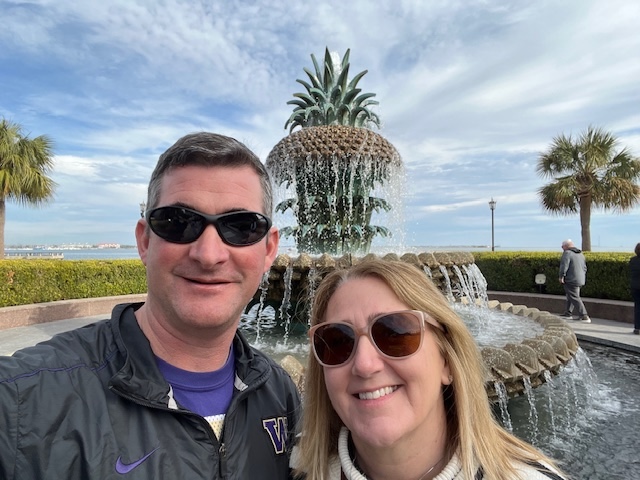
Strategy 4 Saturday (<4-minute read)
- Charleston’s Charm
- Shooting for First Mover Advantage
- The Consistent Improver
- Measure Success Podcast | Sr. V.P. Opportunity International | Mark Lutz
- Coming up this week | Global Advocate and Former Tech CEO | Brad Ketch
- Read all our Blogs on our 40 Strategy Website
|
Charleston’s Charm
Today, I am in Charleston, South Carolina for the High School All-American soccer game, then catch a direct flight to Seattle tonight to watch a club soccer game on Sunday, before driving back to Oregon. We have had the incredible opportunity to watch our children play sports around the country. We have seen many beautiful places around the country, and Charleston is high on this list.
Charleston has incredible history, charm, great food, and wonderful people. In our short visit, we saw the Pineapple Fountain, the French Quarter, The Citadel, and The Tavern, established in 1686. And of course, The Tavern had moonshine. Charleston is a must-see destination, and we plan to return for a future trip.
As this was my first overnight stay in South Carolina; here is a snippet of their history.
- English explorer John Cabot discovered South Carolina in 1497.
- The Spanish settled here in 1562.
- King Charles I, divided North and South Carolina in 1710.
- Over 200 battles occurred here during the Revolutionary War.
- In 1788, it became the 8th State of the Union, and in 1860, it was the first state to succeed from the Union.
- The first shots of the Civil War occurred here in Fort Sumter, on April 12th, 1861.
- The Charleston Civil War Museum maintained by the Daughters of the Confederacy had nearly 2,000 artifacts, regarding the War Between the States, which ultimately claimed the lives of 600,000 and devastated Charleston over the next four years.
Shooting for First Mover Advantage
There is a belief that if you are the first one to market your product and service, that you will win. Entrepreneurs will race to enter the market, spending significant investor resources. The goal is to corner the market and dominate its competitors. However, this goal is often an illusion.
Phil McKenney’s article called, The First Mover Myth, which outlines key companies who may have won initially, but lost the war. The First Movers have a 47% failure rate. Failures include AOL and Betamax, compared to Yahoo! and VHS, respectively. For those who don’t recall or did not personally experience, “You’ve got Mail!”, AOL was American Online and they were dominant. In 1997,half of all US homes used AOL for internet access.
I remember buying a desktop Compaq Presario for $2,500 with only 24 MB of RAM to use AOL in 1998. For comparison, the iPhone 14 has 6 GB of RAM for only $700. The Compaq with AOL service provided extraordinarily slow internet connections from home to search through their ad-dominated browser; but apparently it was better than nothing. I still have my first consulting email, carljconsulting@aol.com.
However, I will never forget the first time that I saw Yahoo! search engine. It was the Eureka moment, I remember thinking to myself, I can NOW search the internet faster. On January 3, 2000, Yahoo! was the most valuable company in the world with a stock price of $475. By September 26, 2001, after the internet bubble, its stock dropped to $8.11. The company lost focus. It tried to become a media company by purchasing multiple companies outside their expertise.
South Carolina was the first to leave the Union, the first to fire the shots, but they did not win the war. Twenty percent of South Carolina white males died during the Civil
War. The state was so devastated it took 38 years to rebuild the State House Building in 1903.
(Picture: Cannon at the Civil War Museum)

The Consistent Improver
McKenney contrasts the First Mover with the Improver. An Improver is an organization that sees a product or service, but they know there is a better way to deliver it. Improvers have only an 8% failure rate compared to the First Mover’s 47% rate.
Google, on the other hand, maintained its focus on search. They made consistent improvements to their Search algorithms. In 2007, they made complimentary purchases such as YouTube and Waze. For the past 16 years, Google has won the battle for search. Today, Google has a whopping 91.5% of the search engine market share.
What I have found is when an organization designs a strategy to win the market, and they have a consistent, competitive, methodical, dare I say, almost boring, approach, they tend to win. From the outside, they are hated like the once dominant 20-year New England Patriots stretch with Tom Brady. But from the inside, winning does not get boring.
Ebsta provides a wonderful illustration of how a 2% increase in your marketing conversion rate and a 2% increase in your sales conversion rate can produce a 30% increase in revenue for a sales rep. Small confident wins with your strategies produces consistent and surprising results.
Over the past 3 years, we have been using this approach with the Measure Success Podcast. Small, incremental improvements. Today, we are in the Top 2% of global podcasts and climbed to a Top 300 US Business podcast. Our goal is to reach a Top 100 US Business podcast by the end of 2024.
How will we do it?
We will continue our incremental improvements, leverage our 5-month backlog of guests, and start to capitalize on the marketing assets that we have built, including 163 recorded episodes. We will engage new audiences with improved recordings, edits, lighting, sound, and videos. You will begin to see these changes by the end of Q1, 2024. Stay tuned.

(Pictured above, The Citadel)
|




